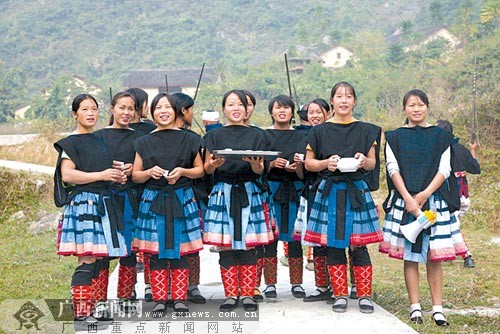Folk customs of Baikuyao

Baikuyao women. [Photo by Liang Hanchang/gxnews.com.cn]
The Baikuyao ethnic group is recognized by the United Nations Educational, Scientific and Cultural Organization (UNESCO) as "the ethnic group with the most complete preservation of folk culture." It has also been called "living fossils of human civilization" by historians and anthropologists.
The Baikuyao is a special branch of the Yao ethnic group. Members of the Baikuyao ethnic group mainly live in Lihu and Bawei townships in Nandan county, Hechi and Yaoshan township in Libo county, Guizhou province, with a total population of about 30,000. As the natural environment is relatively closed and less affected by culture from other areas, Baikuyao people still retain living characteristics conforming to nature.
The Baikuyao's traditional clothing culture, marriage and love culture, bronze drum culture, funeral customs, and original life style are unique in the world.
Traditionally, Baikuyao men wear white pants, while Baikuyao women wear blue and black color skirts. All married men and women tie up their long hair into cockscomb-like headdresses with black cloth and white strips.
The traditional Baikuyao funeral is primitive, mysterious, and grand. It is the most peculiar and representative activity of Baikuyao culture. It is a concentrated display of religious culture, bronze drum culture, as well as marriage and food culture. The funeral is generally chosen in the autumn and winter. The bronze drum is a highlight of the funeral as it is a symbol of Baikuyao's power and wealth, as well as an artifact of pious worship.
Baikuyao's cultural lives are also very colorful and each season has its own unique folk activities, such as playing spinning tops, as well as catching birds, bees, and mice.














